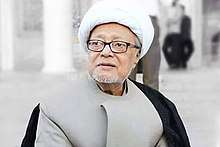Talib Jauhari
Talib Jauhari (27 August 1939 – 21 June 2020) (Urdu: طالب جوہری) was a Pakistani Islamic scholar, poet, historian and philosopher of the Shia Sect of Islam.[1]
Allama Talib Johri علامہ طالب جوہری | |
|---|---|
 Allama Talib Jauhri | |
| Personal | |
| Born | 27 August 1939 Patna, Bihar, British India |
| Died | 22 June 2020 (aged 80) Karachi, Pakistan |
| Religion | Islam |
| Nationality | Pakistan |
| Era | Modern era |
| Denomination | Shīʿa |
| Main interest(s) | Islamic law, Islamic philosophy, Quranic exegesis, Hadith, Ilm al-Kalam, Falsafah, Mantiq |
| Notable idea(s) | interpretation (Tafsir) of Quran |
Career
Talib Jauhari supported ethnic and sectarian harmony his sermons used to be composed on observance of Allah's orders, pursuing the way of Prophet Muhammad and love and respect for Ahlybait. He was not only respected among the Shia community in the Indo-Pak Subcontinent but Sunnis also used to attend his lectures due to his Tafseer-e-Quran in a logical way. He was also a promoter of Shia Sunni unity in Pakistan. [2][3] "His book Hadees-e-Karabla is one of the few Maqtal written in Urdu and has been considered as one of the most well compiled sources to the traditions related to the Event of Karbala."
Education
Talib Jauhari studied Islamic theology in Najaf, Iraq under Ayatollah al Uzma Sayyid Abu al-Qasim al-Khoei. He was a student of Ayatollah Shaheed Sayyid Baqir Al-sadr. He has been a class fellow of Ayatollah al Uzma Sayyid Ali Sistani, although Ayatullah Sistani was among his seniors. Allama Zeeshan Haider Jawwadi was also one of his class fellows in Najaf." [4][5]
Bibliography
Although Talib Jauhari is most famous for Hadees e Karabala this opus was not his only accomplishment. He wrote several books, including a detailed commentary on the Quran. His book “Alamaat e Zahoor e Mehdi” is considered as one of the most comprehensive book compiled and written on the topic of Imam Mehdi in Urdu language.[6] He was also a poet, and three compilations of his poetry were published during his lifetime.[7] The following is a list of his known works:
- Ahsan al Hadees (Qur'anic exegesis)
- Hadees e Karabala
Religion:
- Zikray Masoom
- Nizaam Hayat-e-Insani
- Khulafaey Isna A'shr
- Alamatay Zahooray Mehdi
Philosophy:
- Aqliyat-e-Ma'asir (2005)
Poetry:
- Harf-e-Namoo (Urdu poetry)
- Pas-e-Afaq (Urdu poetry)
- Shakh e Sada (Urdu poetry)
Recognition and awards
He was awarded with Sitara-i-Imtiaz by the Government of Pakistan for its outstanding service in the field of religious activities.[8]
Death and legacy
The 80-year-old Johri was admitted to a private hospital on 10 June. He is said to have been suffering from cardiovascular complications and was on ventilator since then,[9] he passed away on 22 June. However Chief Minister Sindh Murad Ali Shah revealed in a speech at Sindh Assembly that Talib Jauhri, Munawar Hasan and Mufti Naeem, all the three clerics died past week were due to Covid-19.[10]
He was survived by three sons.[11] Prime Minister of Pakistan Imran Khan, President Arif Alvi, Army Chief Qamar Javed Bajwa expressed sadness over his death.[12][13] Earlier in 2014 his son-in-law Syed Mubarak Raza Kazmi was killed in ‘sectarian’ attack [14] in Karachi 13/B, Gulshan-e-Iqbal.
See also
References
- "علامہ طالب جوہری کیلئے دعائے صحت". Jang News.
- http://www.allama.50megs.com/talibjoheryinfo.htm
- https://www.vosa.tv/renowned-religious-islamic-scholar-allama-talib-johri-passes-away/
- https://mmnews.tv/allama-talib-jauhari-end-glorious-era/
- https://mmnews.tv/renowned-scholar-allama-talib-johri-passes-away/
- "Renowned Islamic scholar Allama Talib Johri passes away". The News International.
- "Renowned religious scholar Allama Talib Johri passes away". Geo News.
- https://www.24newshd.tv/22-Jun-2020/allama-talib-johri-passes-away
- "Allama Talib Johri passes away in Karachi". BOL News. 21 June 2020.
- "CM Murad Reveals Munawar Hassan, Talib Jauhari, Mufti Naeem Died From Coronavirus". Naya Daur. 26 June 2020. Retrieved 26 June 2020.
- "Allama Talib Jauhari, Pakistan's renowned Shia scholar, passes away | SAMAA". Samaa TV.
- https://www.bolnews.com/pakistan/2020/06/army-chief-gen-bajwa-condoles-over-the-death-of-allama-talib-jauhari/
- https://www.dailyparliamenttimes.com/2020/06/22/president-prime-minister-others-condole-demise-of-talib-jauhari/#.XvC23ZozbIU
- "Talib Jauhari's son-in-law killed in 'sectarian' attack". The News International.
External links
- "Khursheed-e-Khawar" by Hujjat-ul-Islam Maulana Saeed Akhtar from India (A book on biography of the Shia scholars of South Asia)
- Allama Talib Jauhari Majalis
- Fehm-ul-Quran series by Allama Talib Jauhari on PTV
- Allama Talib Jauhari Books
- Allama Talib Jauhari Online Books
- Allama Talib Jauhri Speeches (Majaalis)
- Ahsan-al-hadees by Allama Talib Jauhari
- Allama Talib Jauhari Lectures/Majalis
- Unity and justice of God Book by Maulana Muhammad Mustafa Jauhar
- 'Truth Wisdom and Justice behind Oneness of Allah' by Maulana Jauhar
- Maulana Mushammad Mustafa Jauhar Lectures
- Allama Amjad Jauhari Majalis
- Assassination attempt on Allama Talib Jauhari